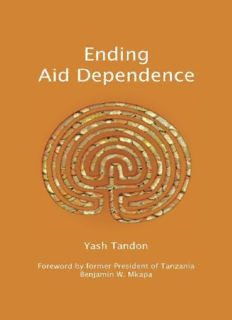
Ending aid dependence PDF
Preview Ending aid dependence
Keep in touch with Fahamu Books Comment on this book online and see what other people have to say about it. Join our email list to receive news of forthcoming Fahamu books or events. Buy another copy of this book and send it to a friend. Recommend this book to a friend. Fahamu Books We are a pan-African publisher of progressive books that aim to stimulate debate, discussion, analysis and engagement on human rights and social justice in Africa and the global South. We have published books and CD-ROMs on Africa, the African Union, capacity building for civil society organisations, China and Africa, conflict, human rights, media, trade, aid & development, and women’s rights. Go to our website where you can read about our other publications, look inside our books and buy our books or CD-ROMs. Get a free ebook when you buy a paperback. Contact us through our website. Contact us by email at [email protected]. South Centre publications See the complete list in English, French and Spanish. Pambazuka News Fahamu also publishes the prize-winning weekly electronic newsletter Pambazuka News. With over 1,000 contributors and an estimated 500,000 readers Pambazuka News is the authoritative pan-African electronic weekly newsletter and platform for social justice in Africa, providing cutting-edge commentary and in-depth analysis on politics and current affairs, development, human rights, refugees, gender issues and culture in Africa. Subscribe to Pambazuka News for free. Published 2008 by Fahamu – Networks for Social Justice Cape Town, Dakar, Nairobi and Oxford www.fahamu.org www.pambazuka.org and South Centre Geneva www.southcentre.org Fahamu, 2nd floor, 51 Cornmarket Street, Oxford OX1 3HA, UK Fahamu Kenya, PO Box 47158, 00100 GPO, Nairobi, Kenya Fahamu Senegal, 9 Cité Sonatel 2, POB 25021, Dakar-Fann, Dakar, Senegal Fahamu South Africa, c/o 27A Esher St, Claremont, 7708, Cape Town, South Africa South Centre, CP 228, 1211 Geneva 19, Switzerland First published 2008 Second edition 2008 Copyright © Yash Tandon 2008 This work is licensed under the Creative Commons Attribution-Noncommercial- No Derivative Works 2.0 UK: England & Wales Licence. To view a copy of this licence, visit http://creativecommons.org/licenses/by-nc-nd/2.0/uk/ or send a letter to Creative Commons, 171 Second Street, Suite 300, San Francisco, California, 94105, USA. You are free to share this work with others provided that you inform them that that the income from the sale of this work helps Fahamu to publish materials in support of movements for social justice in Africa. For those organisations that cannot afford to pay, we are willing to supply copies of this work for free upon application. We welcome donations at http://www.fahamu.org/site/donate to support our providing free copies of the print and electronic editions of this book to organisations in Africa who are unable to pay. British Library Cataloguing in Publication Data A catalogue record for this book is available from the British Library ISBN: 978-1-906387-32-7 ebook ISBN: 978-1-906387-31-0 paperback, 2nd edition Foreword Benjamin W. Mkapa President of Tanzania 1995 – 2005 The primary and long-term objective of this monograph is to initiate a debate on development aid, and to lay out a do-able strategy for ending aid dependence. An exit strategy from aid dependence requires a radical shift both in the mindset and in the development strategy of countries dependent on aid, and a deeper and direct involvement of people in their own development. It also requires a radical and fundamental restructuring of the institutional aid architecture at the global level. The first edition of the book was published just before the high level meeting in September 2008 in Accra organised by the OECD and the World Bank. The aim then was to caution the developing countries against endorsing the Accra Action Agenda (AAA), which was based on the OECD’s Paris Declaration on Aid Effectiveness (PDAE). The PDAE is built on five principles that on first sight look benign. However, on closer analysis, it turns out to be a formula for subjecting aid recipients to a discipline of collective control by the donors right down to the village level, especially in the poorer and more vulnerable countries in Africa, Asia, Latin America and the Caribbean. However, since no serious discussion on the PDAE had taken place in the South, it was not surprising that the AAA was endorsed in Accra by the generally low-level official delegations from the South and several mostly North-dominated intergovernmental organisations. Conspicuously absent, for example, was the African Union. There are fundamental contradictions between the AAA-endorsed Paris Declaration on Aid Effectiveness (PDAE) and the South Centre’s strategy on Aid Exit (SCAE). A simple schema (Table 1) at the end of this Foreword illustrates these differences. The question is: how do we move forward from here? Making aid ‘effective’ will only serve to perpetuate aid dependence. There has to be a strategy for ending aid dependence. This book suggests for debate and further discussion a seven-step strategy for ending aid dependence. The first step is the most
Description: